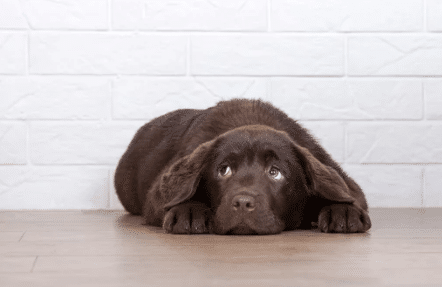
Imagine if an early human were placed in a modern city. What would be their primary experience?
Terror.
Nothing in their prior experience could prepare them for it. Their hearts would pound as metal monsters zip by beneath the giant lit obelisks ascending to heaven, while hordes of varying people unlike anything they had seen lumber around them.
The same is true for a puppy. And the point of socialization is to give them the prior experience that informs their experience in the present when facing unusual stimuli.
“Socialization” simply put, usually refers to the process whereby a young puppy develops various social understandings such as this is safe, or this is dangerous based on its experiences or lack thereof. The term has a slightly different meaning in the scholarly context than in the rest of the doggiesphere. But if you have spent much time reading various dog-related websites and comment sections, you will no doubt have encountered the word. If you have tried to educate yourself on the topic, you might find yourself confused or misinformed.
The problem?
Some sources will claim that the impact of socialization is so all-consuming, that all behavioral problems for any given dog are the result of improper socialization. Given that most sources agree that there is a very limited window of time for the socialization process, this can be particularly disheartening to hear if you’re learning about this when your dog is past that window. Other sources will disagree.
The last 70 years of research regarding the socialization of dogs has produced inconsistent answers to specific questions like “when does it start?”, “when does it end?”, “how big of a role does it play?”, “Where do genetics fit in?”, and many other relevant questions. But what is absolutely clear, is that socialization is real, and has a significant impact on your dog’s level of comfort across environments and therefore its behavior. With respect to the other details, we will try to give some insight, but our ultimate position is that of relative agnosticism, and we defer to our typical advice.
When does it start and end?
We’d argue that it’s best to think of socialization any time your dog experiences something new throughout its life. But typically, socialization is used more or less synonymously with the critical period, where socialization has the biggest impact, from around 4 weeks of age to 16 weeks of age, due to rapid brain development over this time.
“BUT WAIT!” you say, “I have read it begins the day they are born?”
One may find a study or two to vindicate their preferred start date. But it has been repeatedly shown that prior to 3-4 weeks, their brains lack the neural networks to retain socialization efforts. At least one study suggests that too much human interference during the first 2 weeks with its mother and littermates is harmful. A safe middle path would be to starting day 1, but only for only a few minutes a day for the first 4 weeks. Then continuing with proactive socialization till 20 weeks. After that, it will still be prudent to keep it in mind any time your dog will be experiencing something completely novel.
Are behavioral problems rooted in poor socialization?
There is definitely a correlation between anxiety when presented with new stimuli and socialization. Accordingly, there is no room for arguing against or dismissing socialization.
But, for any given situation, the counterfactual has occurred. There have been dogs with no formal socialization efforts, who are perfectly comfortable in all situations. And dogs who have had every socialization effort made, that are timid and fearful in environments. This is not to diminish the power of socialization, but to remain aware of the confluence of factors that are always present.
Isn't it unsafe to take my puppy outside prior to completing their shots?
Opinions differ on this question. There is a risk in taking your puppy outside prior to completion of the recommended 3 rounds of shots. The Texas coalition for animal protection, for example, says the following about the round of shots given at 12+ weeks on their website:
“This is the final round of puppy vaccines. It is important to wait two weeks after this round of vaccines before socializing your puppy or taking them to dog parks.”
Following this advice would mean that your puppy would be at least 14 weeks old before socialization, which would miss the bulk of the critical period.
However, according to The American Veterinary Society of Animal Behavior, the number one cause of death for dogs under 3 years of age is behavioral issues. Such dogs end up in shelters, and thusly, incomplete or improper socialization is a greater risk than incomplete vaccination. Their recommendation is to wait only for one complete one round of vaccines before socialization. But you can still do a lot of socialization inside. In fact, you should. See our step by step guide.
References
Bateson, P. (1979). How do sensitive periods arise and what are they for? Animal Behavior, 27: 470
Elliot, O. & Scott, J. P. (1961). The development of emotional distress reactions to separation in puppies. Journal of Genetic Psychology, 99: 3–22.CrossRefGoogle ScholarPubMed
Bateson, P. (1981). Control of sensitivity to the environment during development. In Behavioral Development, ed. Immelmann, K., Barlow, G. W., Petrovich, L. & Main, M.. Cambridge: Cambridge University Press, pp. 433–53.Google Scholar
Borchelt, P. L. & Voith, V. L. (1982b). Diagnosis and treatment of separation-related behavior problems in dogs. Veterinary Clinics of North America: Small Animal Practice, 12, 625–35.Google ScholarPubMed
Campbell, W. E. (1975). Behavior Problems in Dogs. Santa Barbara, CA: American Veterinary Publications.Google ScholarPubMed
Cornwell, A. C. & Fuller, J. L. (1960). Conditioned responses in young puppies. Journal of Comparative and Physiological Psychology, 54: 13–15.Google Scholar

